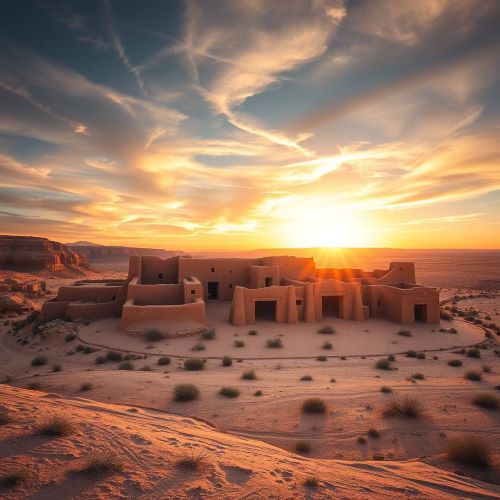Zuni Pueblo : Heart of the Southwest
At a glance
| Description | |
|---|---|
| Mythology | North American Mythology |
| Country | United States of America |
| Closest airport | Albuquerque International Sunport (ABQ) |
| Type | Constructed |
| Accessibility | 09/10 |
Introduction
Zuni Pueblo, located in the rugged landscapes of western New Mexico, is one of the oldest continuously inhabited settlements in North America. For over a millennium, it has been the spiritual and cultural heart of the Zuni people, offering a living connection to ancestral traditions. Surrounded by mesas, buttes, and desert skies, the Pueblo embodies both history and myth, making it a destination where travelers encounter not just a place, but a worldview. Unlike sites that exist only as ruins, Zuni Pueblo thrives as a sovereign community, balancing modern life with cultural continuity.
Connection with Mythology
The mythic heritage of Zuni Pueblo is inseparable from its geography. According to Zuni cosmology, their ancestors emerged from the “fourth world” at Chimik’yana’kya dey’a—identified with Ribbon Falls in the Grand Canyon—before journeying to Halona Idiwan’a, the Middle Place, where they still live today. This emergence story connects humans, animals, and natural forces in a shared cycle of creation and survival.
Central to Zuni belief is Áwonawílona, the all-encompassing creator, whose thoughts manifested as the Sun Father, with Earth Mother and Sky Father shaping the natural world. Deities, twin heroes, and katsina spirits continue to guide the people, symbolized through ritual dances, sacred masks, and the enduring image of the Sunface. The Shalako Ceremony, one of their most important traditions, celebrates harmony between humans, deities, and nature. These rituals reveal a cosmology deeply tied to cycles of time, agriculture, and community balance, keeping myth alive in daily life.
Ways to Get There
Zuni Pueblo lies about 150 miles west of Albuquerque and 40 miles southwest of Gallup, near the Arizona border. The most scenic approach is along Highway 53, also known as the Trail of the Ancients Scenic Byway, which winds past volcanic landscapes, El Malpais, and El Morro National Monuments. Driving remains the most reliable way to reach the Pueblo, though local transit within Zuni is provided by the A:shiwi Transit service.
The nearest major airports are Albuquerque International Sunport (ABQ) and Show Low Regional Airport (SOW) in Arizona. From Albuquerque, the journey by car takes roughly 2.5 hours. Visitors are encouraged to begin at the Zuni Visitor Center, where guides can provide orientation, tours, and important cultural information. Independent exploration is discouraged, as many areas are restricted to protect both privacy and sacred traditions.
What to Look For
Exploring Zuni Pueblo offers travelers a chance to step into a living cultural landscape. The Middle Village (Halona Idiwan’a), with its adobe houses and ceremonial plaza, stands at the heart of Zuni tradition and history. Just outside town, the Hawikuh Ruins, once one of the legendary “Seven Cities of Cíbola,” mark the site of first contact with Europeans in 1540. Visitors can also see the Village of the Great Kivas, where ceremonial structures from the Chacoan era reflect ancient spiritual practices.
The Mission of Our Lady of Guadalupe tells a story of cultural blending, with murals painted by Zuni artists that combine Catholic saints and Zuni deities. For those interested in the arts, Zuni Pueblo is a hub of creativity. Its jewelers, potters, and carvers are world-renowned, especially for intricate silver inlay, turquoise work, and stone fetish carvings. Walking through artisan workshops provides a direct connection to traditions passed down for centuries.
Importance in cultural history
Zuni Pueblo holds a unique place in American history. Long before European settlers arrived, Zuni people had already cultivated the land for thousands of years, growing corn, beans, and squash, and developing complex ceremonial systems. When Spanish explorers under Coronado reached Zuni in 1540 searching for gold, they instead found a thriving society with a rich spiritual and artistic life.
The Pueblo Revolt of 1680 was a defining moment, during which the Zuni, along with other Pueblo peoples, resisted Spanish domination. Retreating to the sacred mesa Dowa Yalanne, they preserved their independence until peace was restored. Over time, Zuni people adapted elements of Catholicism while maintaining their core spiritual traditions, creating a layered cultural identity visible in their ceremonies and architecture.
Linguistically, Zuni is remarkable as an isolate language, unrelated to any other in North America. About 85% of Zuni people still speak Shiwi’ma, ensuring continuity of oral traditions and ritual knowledge. Today, Zuni Pueblo is the largest of New Mexico’s 19 pueblos, home to over 10,000 residents and a strong economy based on agriculture, art, and cultural tourism.
Best time to travel
The best seasons to experience Zuni Pueblo are spring and fall, when mild weather makes outdoor exploration comfortable and community events are more accessible. Spring months bring the renewal of the agricultural cycle, while autumn coincides with harvest traditions. Summers can be hot, with sudden monsoon rains affecting road conditions, though festivals like the Zuni Tribal Fair in August draw many visitors. Winter carries its own charm, with crisp air and the possibility of witnessing the Shalako Ceremony, though access is often limited and respectful observation is required.
Regardless of the season, visitors should always check ahead for schedules, as ceremonies and cultural events are planned according to traditional calendars, not tourist timetables. Respecting these rhythms is part of honoring the sovereignty and traditions of the Zuni people.
Source
Anyon, R. (1989). Cooperation at the Pueblo of Zuni. https://www.tandfonline.com/doi/abs/10.17730/praa.11.3.x35w3v252624702t
Britannica. (2025, April 16). A:Shiwi | Zuni, People, Native American, Pueblo, & …. https://www.britannica.com/topic/AShiwi
National Park Service. (2023, July 25). Hawikuh and Zuni-Cibola Complex, NM – National Park Service. https://www.nps.gov/places/hawikuh-and-zuni-cibola-complex-nm.htm
Native Languages of the Americas. Zuni Legends (Folklore, Myths, and Traditional Indian Stories). https://www.native-languages.org/zuni-legends.htm
New Mexico Tourism Department. (2021, November 10). Zuni Pueblo – New Mexico Tourism Department. https://www.newmexico.org/native-culture/native-communities/zuni-pueblo/
Palms Trading Company. (2022, January 17). The Zuni People: History & Culture – Palms Trading Company. https://www.palmstrading.com/the-zuni-people-history-culture/
Sacred-texts. Zuñi Origin Myths by Ruth Bunzel. https://sacred-texts.com/nam/zuni/bunzel/zom.htm
Sebastian Wetherbee. (2020, April 19). Extrapolation and Excavation: Ancestral Puebloan Mythology. https://www.sebastianwetherbee.com/journal/extrapolation-and-excavation-ancestral-puebloan-mythology
Times of India. (2015, February 6). Zuni Pueblo, New Mexico – Times of India. https://timesofindia.indiatimes.com/travel/new-mexico/travel-guide/zuni-pueblo/gs46141307.cms
University of Arizona. (2025, January 1). Zuni Tribe of the Zuni Reservation, New Mexico. https://naair.arizona.edu/pueblo-zuni
Wikipedia. Zuni people – Wikipedia. https://en.wikipedia.org/wiki/Zuni_people
Wikipedia. Zuni mythology – Wikipedia. https://en.wikipedia.org/wiki/Zuni_mythology
Zuni Tourism. (2000, January 1). Zuni History. http://zunitourism.com/about-zuni/zuni-history
Frequently Asked Questions
Lorem ipsum dolor sit amet, consectetur adipiscing?
Lorem ipsum dolor sit amet, consectetur adipiscing elit. Praesent convallis vestibulum justo, ac tincidunt nunc vehicula quis. Nullam id dolor quis orci malesuada feugiat. Curabitur aliquet libero at urna ullamcorper, ac ultricies nulla dapibus.
Lorem ipsum dolor sit amet, consectetur adipiscing?
Lorem ipsum dolor sit amet, consectetur adipiscing elit. Praesent convallis vestibulum justo, ac tincidunt nunc vehicula quis. Nullam id dolor quis orci malesuada feugiat. Curabitur aliquet libero at urna ullamcorper, ac ultricies nulla dapibus.
Lorem ipsum dolor sit amet, consectetur adipiscing?
Lorem ipsum dolor sit amet, consectetur adipiscing elit. Praesent convallis vestibulum justo, ac tincidunt nunc vehicula quis. Nullam id dolor quis orci malesuada feugiat. Curabitur aliquet libero at urna ullamcorper, ac ultricies nulla dapibus.
Lorem ipsum dolor sit amet, consectetur adipiscing?
Lorem ipsum dolor sit amet, consectetur adipiscing elit. Praesent convallis vestibulum justo, ac tincidunt nunc vehicula quis. Nullam id dolor quis orci malesuada feugiat. Curabitur aliquet libero at urna ullamcorper, ac ultricies nulla dapibus.
Lorem ipsum dolor sit amet, consectetur adipiscing?
Lorem ipsum dolor sit amet, consectetur adipiscing elit. Praesent convallis vestibulum justo, ac tincidunt nunc vehicula quis. Nullam id dolor quis orci malesuada feugiat. Curabitur aliquet libero at urna ullamcorper, ac ultricies nulla dapibus.










Vergie Moen
Your blog is a shining example of excellence in content creation. I’m continually impressed by the depth of your knowledge and the clarity of your writing. Thank you for all that you do.
profis-vor-ort.de
Thank you for sharing such a well-structured and easy-to-digest post. It’s not always easy to find content that strikes the right balance between informative and engaging, but this piece really delivered. I appreciated how each section built on the last without overwhelming the reader. Even though I’ve come across similar topics before, the way you presented the information here made it more approachable. I’ll definitely be returning to this as a reference point. It’s the kind of post that’s genuinely helpful no matter your level of experience with the subject. Looking forward to reading more of your work—keep it up! profis-vor-ort.de
Margie Kiehn
I just wanted to drop by and say how much I appreciate your blog. Your writing style is both engaging and informative, making it a pleasure to read. Looking forward to your future posts!